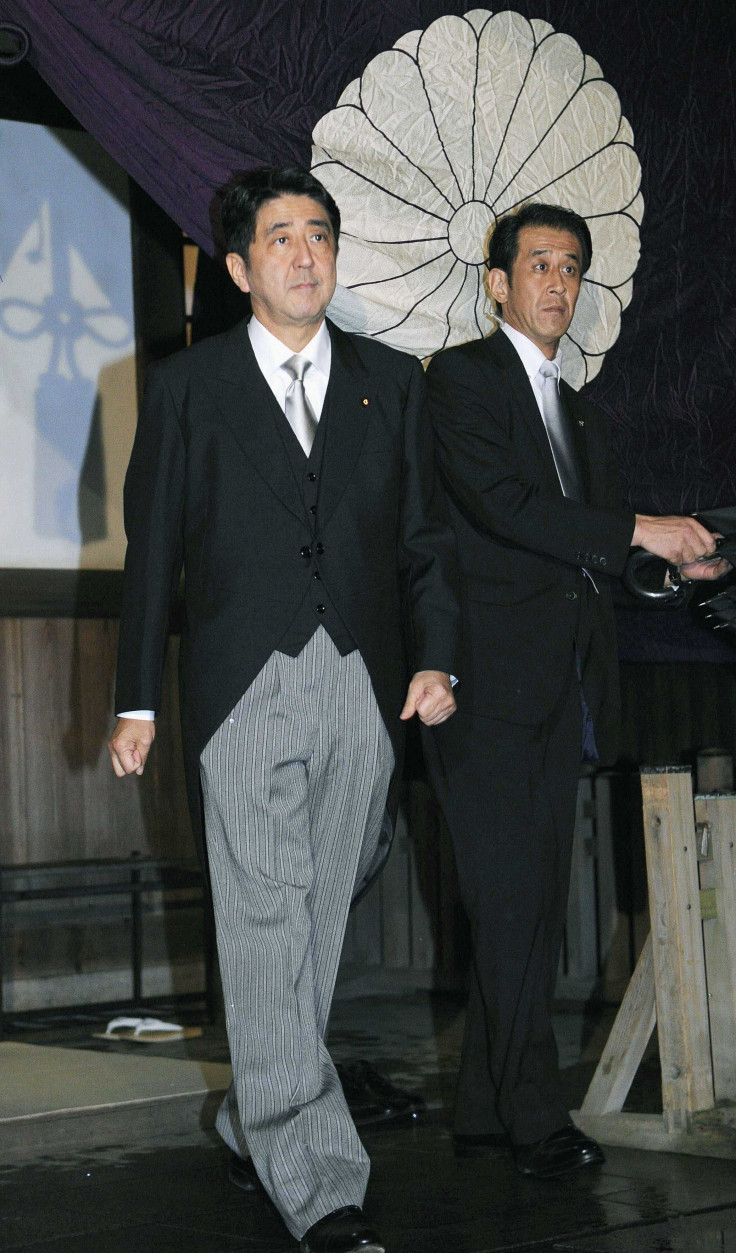Honoring War Criminals: China, South Korea Harbor Bad Feelings For Japan's Yasukuni Shrine

Japanese officials have again inflamed tensions between their country and its neighbors, China and South Korea, after making a controversial visit to a shrine that honors several convicted war criminals among millions of war dead, raising the specter of Japan’s past military aggression in the region.
Former Prime Minister Shinzo Abe, now a conservative opposition leader, visited the Yasukuni Shrine in Tokyo this week, followed by two other Cabinet ministers, despite criticism from China and South Korea over past visits.
Korea and large parts of China were occupied by Japan during the half-century leading up to and encompassing World War II, and were the site of wartime atrocities and brutal exploitation by Japanese forces.
Some of the era’s most notorious war criminals, including major general and prime minister Hideki Tojo -- who oversaw troops in colonized Korea and annexations of China as Japan’s supreme military commander in the region, and whom China holds responsible for ordering the 1937 massacre in Nanjing among numerous wartime offenses -- are enshrined at Yasukuni.
“China’s position is consistent and clear. We demand the Japanese side view and reflect on history truthfully,” Chinese Foreign Minister Hong Lei said in press conference Thursday, responding to the visits.
"It is really regrettable to hear about the irresponsible behavior that ignores the feelings of the people in neighboring countries, who have been victimized by Japanese imperialism in the past," Cho Tai-young, a spokesman for South Korea's Foreign Ministry chimed in, the BBC reported.
The controversy has heightened tensions over long-festering territorial disputes between Japan and its two historically and geographically close neighbors.
China has claimed a set of islands in the East China Sea it refers to as the Diaoyu, which Japan claims as the Senkaku Islands. South Korea claims the Dokdo Islands in the Sea of Japan, which Japan claims as the Takeshima Islands.
There is concern in China and South Korea that Abe, widely viewed as a staunch nationalist and hawkish leader, would take a hardline stance on the territorial disputes if he returns as prime minister in the coming parliamentary elections.
Abe, 58, served as prime minister from 2006 to 2007 before stepping down amid low approval ratings.
He has been a polarizing figure over his support for historical revisionism in Japanese textbooks to presents a more sympathetic view of Japan’s militaristic past, as well as for supporting an expansion of Japan’s military, which was restricted by the country’s U.S.-dictated constitution after World War II. He has also publicly denied the Japanese military’s involvement in the sexual exploitation of women during the early half of the 20th century, which has caused particular outrage in South Korea, where it is well documented that thousands of women were forced to service Japanese soldiers in “comfort stations.”
Abe’s Liberal Democratic Party, which ruled Japan for decades, is widely anticipated to regain a majority in the next parliamentary elections.
Some analysts, however, believe Abe would take a more moderate stance if he were to return to power.
“Within the party, he had to take a strong stand,” said Shusei Tanaka, a politics expert at Fukuyama University, the New York Times reported. “The question now is whether he has learned that the same hardline stand would turn off the general public.”
Abe’s popularity during his first stint as prime minister suffered over his jingoistic rhetoric, but he has also demonstrated an awareness of his country’s need to preserve diplomatic ties with its neighbors, particularly China.
China is Japan’s primary trading partner, and the economic relationship between the world’s second and third largest economies, respectively, is no doubt is a vital concern for both.
At the same time, China’s military expansion in recent years has disconcerted many in Japan, who fear that the country may begin aggressively asserting its territorial claims in the Pacific region.
China and Japan have already engaged in several high-seas standoffs over the Diaoyu/Senkaku Islands, as well as over maritime borders most often involving Chinese fishing vessels within Japanese waters.
The U.S. is bound by treaty to defend Japan against a military attack, but it is not clear to what extent it is willing to go to defend Japan’s territorial claims, particularly if it means going to war with China.
“If he [Abe] follows through on what he’s been saying, we could have serious problems,” said Gerald L. Curtis, an expert on Japanese politics at Columbia University, the Times reported. “Who the heck wants to go to war over the Senkakus?”
IBTimes reporter Michelle FlorCruz contributed to this report.
© Copyright IBTimes 2024. All rights reserved.




















